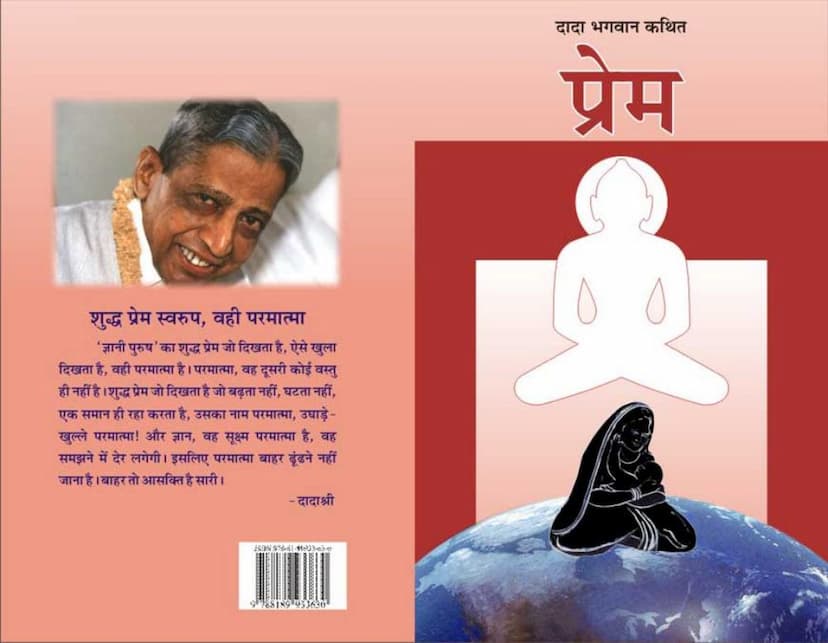Prem
Added to library: September 2, 2025

Summary
Here's a comprehensive summary of the Jain text "Prem" by Dada Bhagwan, based on the provided pages:
The book "Prem" (Love) by Dada Bhagwan, published by Mahavideh Foundation, explores the profound nature of true love, differentiating it from worldly attachments and affections. The core message emphasizes that true love is an innate, unchanging, and divine quality, synonymous with the Self (Atma) and ultimately with the Supreme Being (Parmatma).
Key Concepts and Teachings:
-
The Nature of True Love (Prem):
- Unchanging and Eternal: True love is described as that which neither increases nor decreases, remaining constant in all situations. It is not affected by praise or criticism, pleasure or pain. This unchanging love is the essence of the Self and is synonymous with Parmatma.
- Unconditional (Ahetuki): True love is without any conditions, expectations, selfishness, or fault-finding. Any love that has a motive or expectation attached is considered attachment (aasakti) and not true love.
- Distinction from Attachment (Aasakti): The book rigorously distinguishes between true love and attachment. Attachments are temporary, fluctuate with circumstances, and are driven by ego and self-interest. When the desired outcome is not met, these "loves" diminish or turn into negativity.
- Beyond Moh (Delusion/Infatuation): Moh, or infatuation, is also identified as a form of attachment driven by the expectation of return. When this expectation is not met, disappointment and grief arise, revealing its impure nature.
- The Love of the Enlightened (Gnanis): The love exhibited by enlightened beings (Gnanis) is presented as the purest form. They possess an unwavering, unconditional love for all beings, unaffected by external actions. This love is the manifestation of Parmatma.
-
The Source of True Love:
- The Self (Atma): True love is not something to be found externally but resides within one's own Self. It is the intrinsic nature of the Self, which is already pure and complete.
- The Enlightened Being: The only way to realize this true love is through the grace of a Gnani Purush (an enlightened soul). They act as a living example and can impart the knowledge that awakens one's own Self-realization, leading to the experience of true love.
-
The Worldly Understanding of Love:
- Misconceptions: The world misunderstands love, equating it with temporary affections, emotional outbursts, and conditional relationships (like those between parents and children, husband and wife).
- Fluctuations: Human love is characterized by its constant ebb and flow, dependence on external factors, and susceptibility to ego and expectations. This is illustrated through examples like a mother's love being conditional on a child's success or a husband's love changing based on circumstances.
- Selfishness as the Root: All worldly affections are rooted in selfishness ("mine" and "yours"), ego, and ignorance. Where selfishness exists, true love cannot reside, and vice versa.
-
The Path to True Love:
- Self-Knowledge (Atma-Gnan): The ultimate key to experiencing true love is attaining Self-knowledge through a Gnani Purush. This process reveals the true nature of the Self, which is love itself.
- Living in Accordance with the Gnani's Guidance: By following the teachings and principles of the Gnani, one gradually sheds the illusions and attachments that obscure true love.
- Discernment: It is crucial to discern between true love and attachment. Recognizing the conditional and fluctuating nature of worldly relationships helps in this discernment.
-
Dada Bhagwan's Identity and Teachings:
- The Gnani Purush: The book introduces Dada Bhagwan (Shri Ambalal M. Patel) as the Gnani Purush who attained Self-realization in 1958. He gained complete understanding of the Self, God, the world, and karma.
- The Akram Marg (Non-linear Path): Dada Bhagwan provided a shortcut (a "lift" rather than a staircase) to Self-realization, known as the Akram Marg. This path allows for rapid spiritual progress.
- The "Dada Bhagwan" within: Dada Bhagwan clarified that the visible form ("A.M. Patel") was not Dada Bhagwan. The true Dada Bhagwan is the Self within, present in everyone, and fully manifest within him.
- Empowerment: He empowered others, like Dr. Niruben Amin and Deepakbhai Desai, to help seekers attain Self-knowledge, continuing his mission even after his physical departure.
Key Takeaways:
- The book emphasizes that true love is not an emotion or a behavior but a state of being, the very essence of the Self.
- The world's understanding of love is fundamentally flawed, being based on attachment, selfishness, and delusion.
- Attaining Self-knowledge from an enlightened being is the only way to transcend these worldly limitations and experience the eternal, unconditional love that is Parmatma.
- The teachings of Dada Bhagwan offer a practical path to realize this true love and live a life free from suffering caused by attachments.
- The book uses relatable examples and dialogues to illustrate complex spiritual concepts, making them accessible to the reader.
In essence, "Prem" guides the reader to look beyond superficial affections and emotions to discover the profound, unchanging, and divine love that resides within, accessible through the grace of a Gnani Purush and the attainment of Self-knowledge.